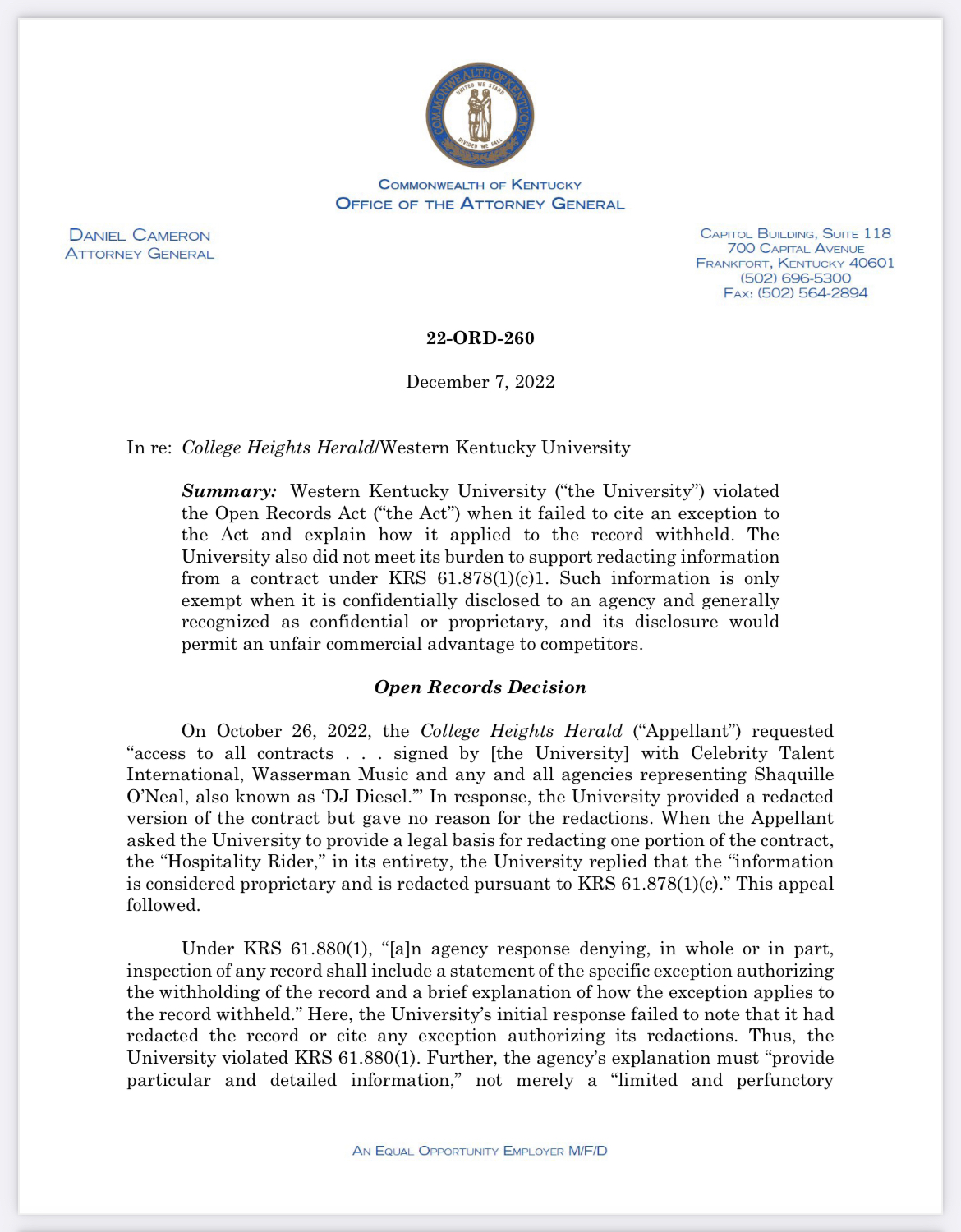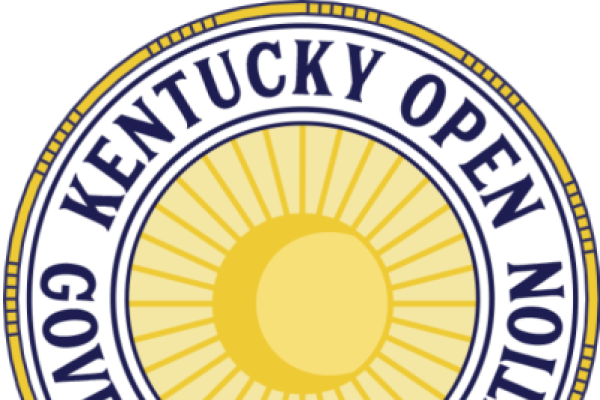
Western Kentucky University once again finds itself in an open records dispute with its student newspaper, WKUherald.com and, once again, it's student newspaper has prevailed.
https://wkuherald.com/69719/news/wku-found-in-violation-of-kentucky-ope…
The Herald co-editor-in-chief, Jake Moore, reports that on Wednesday the Office of the Attorney General issued an open records decision in which it determined:
"Western Kentucky University violated the Open Records Act when it failed to cite an exception to the Act and explain how it applied to the record withheld. The University also did not meet its burden to support redacting information from a contract under KRS 61.878(1)(c)1. Such information is only exempt when it is confidentially disclosed to an agency and generally recognized as confidential or proprietary, and its disclosure would permit an unfair commercial advantage to competitors."
https://wkuherald.com/wp-content/uploads/2022/12/22-ORD-260.pdf
In late October the Herald requested “access to all contracts . . . signed by [the University] with Celebrity Talent International, Wasserman Music and any and all agencies representing Shaquille O’Neal, also known as ‘DJ Diesel.’”
The university "provided a redacted version of the contract but gave no reason for the redactions." The newspaper thereafter asked the university to identify the open records exception authorizing nondisclosure of the “Hospitality Rider." WKU responded that the “information is considered proprietary and is redacted pursuant to KRS 61.878(1)(c).”
That exception authorizes public agencies to withhold "records confidentially disclosed to an agency or required by an agency to be disclosed to it, generally recognized as confidential or proprietary, which if openly disclosed would permit an unfair commercial advantage to competitors of the entity that disclosed the records[.]" It is generally reserved, the Attorney General notes, for records disclosing private financial affairs, trade secrets, investment strategies, economic status, or business structures, costing and pricing strategy, and "the inner workings of the private entity."
https://apps.legislature.ky.gov/law/statutes/statute.aspx?id=51393
On appeal, the university argued that "the information contained in the Hospitality Rider relates to artist preference for specific products, transportation and accommodation which contain actual or anticipated business relationships, and upon information and belief is generally recognized in the entertainment industry as confidential. This 'information and belief' is based on representations to the University by Wasserman Music/Mine o’ Mine Holdings."
Apparently, Wasserman Music/Mine o' Mine was disinclined to back up the "belief" that hospitality services are “generally recognized as confidential in the entertainment industry." WKU requested that Wasserman "provide information in support of the 'confidential' nature of the Hospitality Rider, but received no response."
WKU failed to demonstrate that the hospitality service rider was confidentially disclosed to the university -- a precondition to invoking the exception.
The rider "does not mention confidentiality, nor has the University indicated any other part of the contract referring to the hospitality provisions expressly refers to those sections as 'confidential.' The University merely states the private entity requested it to redact the Hospitality Rider after" the newspaper appealed.
Moreover, "the types of information in the Hospitality Rider are not similar to those previously affirmed as confidential or proprietary under KRS 61.878(1)(c)1, as they do not tend to disclose the inner workings or financial status of any private entity."
Finally, WKU offers no proof that disclosure of the Hospitality Rider "would permit an unfair commercial advantage to competitors of the entity that disclosed” it.
"The University," the Attorney General notes, "has not even alleged this to be the case."
Stated simply, WKU utterly failed to prove that it properly denied the Herald access to the Hospitality Rider in its contract “with Celebrity Talent International, Wasserman Music and any and all agencies representing Shaquille O’Neal, also known as ‘DJ Diesel.’”
Moore concludes that "the Attorney General’s decision does not order WKU to provide an unredacted copy of the contract" and that the Herald has therefore "filed another open records request."
This is an interesting strategy. The open records law gives WKU up to thirty days to decide whether to comply with the Attorney General's decision or appeal it to the Warren Circuit Court. By filing a new request, the newspaper has arguably triggered WKU's duty to produce the unredacted contract within five business days -- an interesting dilemma for the university (which risks compounding its error by delaying a response to the new request). 🤔
In an analysis about this open records dispute posted on November 8, the Kentucky Open Government Coalition observed:
"Kentucky’s universities — whose administrations enjoy monetary and staffing resources far greater than many state and most local agencies — regularly deviate from the open records law with apparent impunity.
https://casetext.com/case/univ-of-ky-v-kernel-press-inc (https://casetext.com/case/univ-of-ky-v-kernel-press-inc)
"When admonished for their misconduct, they largely ignore the court’s admonitions. It is — quite frankly — inexcusable.
"More importantly, it is illegal."
https://kyopengov.org/blog/tapping-university-defiance-public-records-l… (https://kyopengov.org/blog/tapping-university-defiance-public-records-l…)
We trust that WKU will not compound the error here by delaying production of an unredacted copy of a contract it made no serious effort to legitimately withhold.
